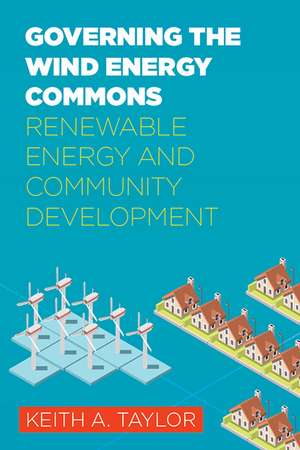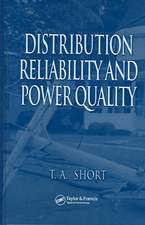Governing the Wind Energy Commons: Renewable Energy and Community Development: Rural Studies
Autor Keith A. Tayloren Limba Engleză Paperback – 20 mai 2019
Wind energy is often framed as a factor in rural economic development, an element of the emerging “green economy” destined to upset the dominant greenhouse- gas-emitting energy industry and deliver conscious capitalism to host communities. The bulk of wind energy firms, however, are subsidiaries of the same fossil fuel companies that wrought havoc in shale-gas and coal-mining towns from rural Appalachia to the Great Plains. On its own, wind energy development does not automatically translate into community development.
In Governing the Wind Energy Commons, Keith Taylor asks whether revenue generated by wind power can be put to community well-being rather than corporate profit. He looks to the promising example of rural electric cooperatives, owned and governed by the 42 million Americans they serve, which generate $40 billion in annual revenue. Through case studies of a North Dakota wind energy cooperative and an investor-owned wind farm in Illinois, Taylor examines how regulatory and social forces are shaping this emerging energy sector. He draws on interviews with local residents to assess strategies for tipping the balance of power away from absentee-owned utilities.
In Governing the Wind Energy Commons, Keith Taylor asks whether revenue generated by wind power can be put to community well-being rather than corporate profit. He looks to the promising example of rural electric cooperatives, owned and governed by the 42 million Americans they serve, which generate $40 billion in annual revenue. Through case studies of a North Dakota wind energy cooperative and an investor-owned wind farm in Illinois, Taylor examines how regulatory and social forces are shaping this emerging energy sector. He draws on interviews with local residents to assess strategies for tipping the balance of power away from absentee-owned utilities.
| Toate formatele și edițiile | Preț | Express |
|---|---|---|
| Paperback (1) | 235.71 lei 6-8 săpt. | |
| West Virginia University Press – 20 mai 2019 | 235.71 lei 6-8 săpt. | |
| Hardback (1) | 585.65 lei 6-8 săpt. | |
| West Virginia University Press – 30 iun 2019 | 585.65 lei 6-8 săpt. |
Din seria Rural Studies
-
 Preț: 197.41 lei
Preț: 197.41 lei -
 Preț: 194.53 lei
Preț: 194.53 lei -
 Preț: 322.33 lei
Preț: 322.33 lei -
 Preț: 278.33 lei
Preț: 278.33 lei -
 Preț: 336.72 lei
Preț: 336.72 lei -
 Preț: 246.29 lei
Preț: 246.29 lei -
 Preț: 283.16 lei
Preț: 283.16 lei -
 Preț: 246.46 lei
Preț: 246.46 lei -
 Preț: 250.92 lei
Preț: 250.92 lei -
 Preț: 244.55 lei
Preț: 244.55 lei -
 Preț: 249.17 lei
Preț: 249.17 lei -
 Preț: 244.55 lei
Preț: 244.55 lei -
 Preț: 283.48 lei
Preț: 283.48 lei -
 Preț: 199.80 lei
Preț: 199.80 lei -
 Preț: 272.92 lei
Preț: 272.92 lei - 23%
 Preț: 467.68 lei
Preț: 467.68 lei
Preț: 235.71 lei
Nou
Puncte Express: 354
Preț estimativ în valută:
45.11€ • 46.92$ • 37.24£
45.11€ • 46.92$ • 37.24£
Carte tipărită la comandă
Livrare economică 15-29 aprilie
Preluare comenzi: 021 569.72.76
Specificații
ISBN-13: 9781946684851
ISBN-10: 1946684856
Pagini: 180
Ilustrații: 10
Dimensiuni: 152 x 229 x 15 mm
Greutate: 0.34 kg
Ediția:1st Edition
Editura: West Virginia University Press
Colecția West Virginia University Press
Seria Rural Studies
ISBN-10: 1946684856
Pagini: 180
Ilustrații: 10
Dimensiuni: 152 x 229 x 15 mm
Greutate: 0.34 kg
Ediția:1st Edition
Editura: West Virginia University Press
Colecția West Virginia University Press
Seria Rural Studies
Recenzii
“This is a groundbreaking work that addresses the potential and limitations of alternative economic models for delivery of a key service: electricity.”
Cornelia Flora, Iowa State University
Cornelia Flora, Iowa State University
Notă biografică
Keith A. Taylor is community economic development specialist faculty in the department of human ecology at the University of California, Davis. He holds a PhD in human and community development from the University of Illinois at Urbana-Champaign.
Cuprins
Introduction
Community Development & Institutional Fit
Case Study - The Investor-Owned Wind Farm
Case Study - The Co-operative-Owned Wind Farm
Comparing the Investor & Co-operative Owned Firms
Why Not Policy From Below?
Community Development & Institutional Fit
Case Study - The Investor-Owned Wind Farm
Case Study - The Co-operative-Owned Wind Farm
Comparing the Investor & Co-operative Owned Firms
Why Not Policy From Below?
Textul de pe ultima copertă
Wind energy is often framed as a factor in rural economic development, an element of the emerging “green economy” destined to upset the dominant greenhouse- gas-emitting energy industry and deliver conscious capitalism to host communities. The bulk of wind energy firms, however, are subsidiaries of the same fossil fuel companies that wrought havoc in shale-gas and coal-mining towns from rural Appalachia to the Great Plains. On its own, wind energy development does not automatically translate into community development.
In Governing the Wind Energy Commons, Keith Taylor asks whether revenue generated by wind power can be put to community well-being rather than corporate profit. He looks to the promising example of rural electric cooperatives, owned and governed by the 42 million Americans they serve, which generate $40 billion in annual revenue. Through case studies of a North Dakota wind energy cooperative and an investor-owned wind farm in Illinois, Taylor examines how regulatory and social forces are shaping this emerging energy sector. He draws on interviews with local residents to assess strategies for tipping the balance of power away from absentee-owned utilities.
In Governing the Wind Energy Commons, Keith Taylor asks whether revenue generated by wind power can be put to community well-being rather than corporate profit. He looks to the promising example of rural electric cooperatives, owned and governed by the 42 million Americans they serve, which generate $40 billion in annual revenue. Through case studies of a North Dakota wind energy cooperative and an investor-owned wind farm in Illinois, Taylor examines how regulatory and social forces are shaping this emerging energy sector. He draws on interviews with local residents to assess strategies for tipping the balance of power away from absentee-owned utilities.















